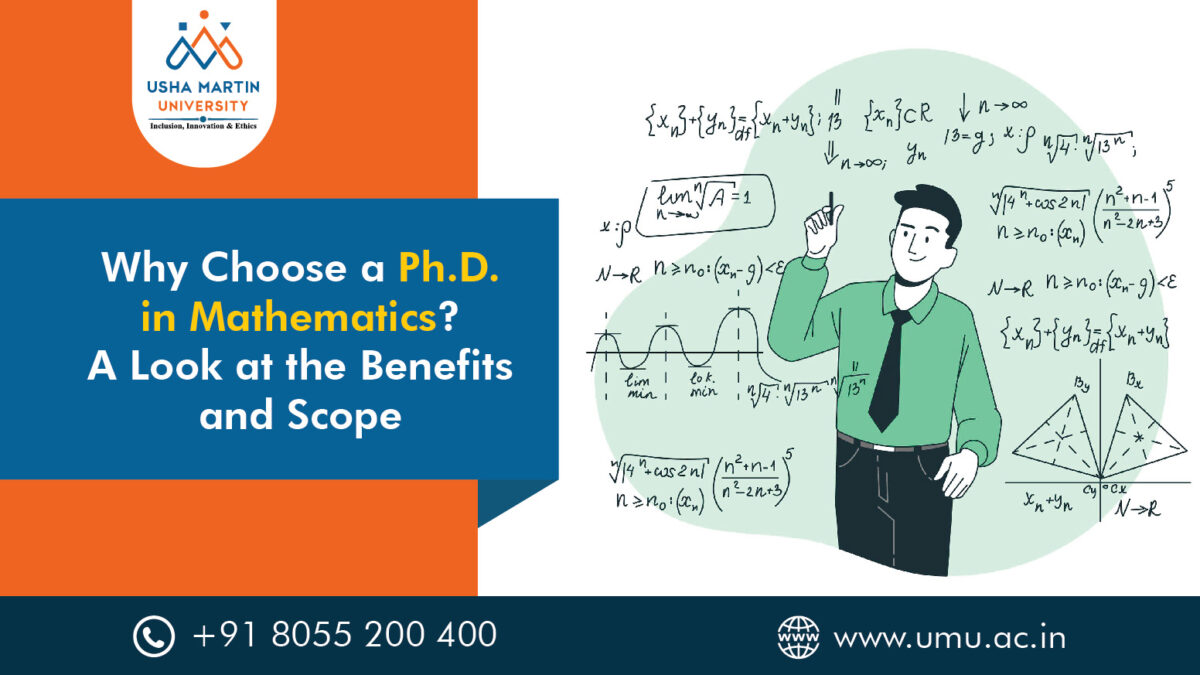
PhD Computer Science 2025: Key Dates for Entrance and Last Date to Apply
December 9, 2024
Advance Your Career with These Top Diploma Courses for Working Professionals
December 11, 2024What is Phd in Mathematics
A PhD in Mathematics is a doctoral degree that enables you to undergo a research program during the study of the subject. It includes comprehensive exams, dissertation or thesis writing and coursework /curriculum to dig out new findings and offer to the study for further innovation. This degree offers individuals for careers in academia, research, and other fields that require deep mathematical expertise and problem-solving skills. Ph.D Mathematics hold array of job opportunities and is vested with numerous career scope that will enable you to explore the depth and of the subject” Mathematics”. After completion of the course program the student is well versed with the subject and is ready to contribute in the innovation of the subject’s concepts.
Phd in Mathematics Eligibility Criteria
- M.Sc. in Mathematics or equivalent degree with 55% marks (50% for reserved categories).
- Preference will be given to candidates who have cleared UGC-NET (including JRF) or equivalent examinations.
Phd in Mathematics Duration
- Minimum Duration: 3 years, including coursework.
- Maximum Duration: 6 years, with extensions provided as per UGC regulations.
Phd in Mathematics Course Work Curriculum/Syllabus –
The coursework is structured to align with UGC guidelines, ensuring comprehensive research training.
Coursework Components:
- Research Methodology
- Covers research techniques, quantitative and qualitative analysis, and academic writing.
- Develops critical thinking and analytical skills essential for high-quality research.
- One Core Paper Related to the Discipline of Research
- Topics include mathematical modelling, numerical analysis, applied mathematics, functional analysis, mathematical physics, astrophysics.
- These courses aim to solidify foundational knowledge and explore specialized field.
- Research and Publication Ethics (RPE)
- Provides a thorough understanding of ethical research practices and publication norms.
- Topics include plagiarism prevention, intellectual property rights, and research integrity.
- Research Training (Review Paper)
Ph.D. Programs domain –
The core of the PhD is independent, original research, culminating in a dissertation. Preferred research areas are:
- Mathematical Modelling.
- Numerical analysis.
- Applied Mathematics.
- Functional analysis.
- Mathematical physics
- Astrophysics
The coursework is structured to align with UGC guidelines, ensuring comprehensive research training.
Career Scope after PhD in Mathematics –
Career in PhD in Mathematics offers plethora of rewarding and exciting opportunities.
- Academia: Where students can take up opportunities as teachers or professors or research scientists contributing in the field of innovation of the subject.
- Industry: As a Data Scientist to interpret and analyze mathematical models of complex data. As Quantitative Analyst application of mathematical techniques minimizes the financial risk and development investment strategies. Working as a cryptographer has the ability to secure communication systems as a part of cybersecurity.
- Government and Research Institutes: There are many government bodies where students can obtain job as mathematics or statisticians. Working in or governmental agencies on projects that require advanced mathematical skills with more proficient in statistical methods.
- Tech Companies: Working as Algorithm Developer can take care of software and hardware solutions.
- Machine Learning Engineer: Designing and implementing machine learning models.
A PhD in Mathematics equips you with problem-solving skills, analytical thinking, and a deep understanding of mathematical concepts, making you a valuable asset in many fields.
Job Profiles and Career opportunities Phd in Mathematics –
With a PhD Programs in Mathematics, you’ll have access to a wide range of job profiles. Here are some examples:
- Professor: Teach and conduct research at universities or colleges.
- Research Scientist: Lead innovative research projects in various fields.
- Data Scientist: Analyze and interpret complex data to inform business decisions.
- Quantitative Analyst (Quant): Develop and implement mathematical models in finance.
- Cryptographer: Design and analyze secure communication systems.
- Algorithm Developer: Create algorithms for software and hardware solutions.
- Machine Learning Engineer: Develop and deploy machine learning models.
- Statistician: Apply statistical methods to collect, analyze, and interpret data.
- Consultant: Provide expert advice on mathematical and statistical methods.
- Science Writer: Communicate complex mathematical ideas to a broader audience.
Each of these roles leverages the advanced problem-solving skills, analytical thinking, and deep mathematical knowledge gained through a PhD program.
Why Choose Phd In Mathematics –
Choosing to pursue a PhD in Mathematics can be a life-changing decision, offering both personal and professional rewards as Ph.D provides an opportunity to deepen your understanding and contribute to the field. Engage in original research promotes significant contributions to mathematical knowledge. Completing Ph.D often fosters high-level and well-paying positions. Enhance your ability to abstract problems and tackle complex thereby building critical and analytical thinking. Your research can contribute to advancements in technology, science, and various fields that rely on mathematical principles.
Programme Learning Outcomes –
Acquire a thorough understanding of particular branches of mathematics, such as applied mathematics, geometry, algebra, study, or analysis. Gain a thorough understanding of the relationships and the larger area of mathematics. Create new mathematical ideas and techniques, conduct novel research, and generate hypotheses. Examine the body of existing literature critically, spot any gaps, and offer fresh perspectives. Use sophisticated approaches and strategies to solve abstract and challenging mathematical problems. Create original solutions to difficult mathematics problems. Writing excellent dissertations, research papers, and articles that are appropriate for academic journal publishing. Effectively communicate research findings through public lectures, conferences, and seminars to both academic and non-academic audiences. Acquire expertise in teaching graduate and undergraduate courses, including creating curricula and evaluation strategies. Students should be mentored and guided in their academic and research endeavors.
These outcomes collectively prepare you for a successful career in academia, industry, government, or other sectors where advanced mathematical skills are in demand.





